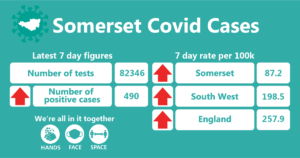Welcome to the latest edition of the weekly Somerset Covid-19 update for key stakeholders. This update is produced on behalf of the Somerset Covid-19 Engagement Board and is designed to provide a weekly update on the current Covid-19 situation in Somerset.
On Monday, the Prime Minister set out the plans for the final step of the roadmap out of lockdown for England. Step 4 is expected to begin on Monday 19 July if the Government’s ‘four tests’ for easing restrictions have been met, and we will receive an update from the Government about this next Monday. The details that we know so far, can be found in this update.
We appreciate that some people see Step 4 as ‘back to normal’ but it’s important to understand that the pandemic is not over, Covid-19 is still with us. In line with the national picture, cases here in Somerset are still rising, and we recommend that everyone continues to be sensible and to ‘think twice’. Just because we might be able to do so much more after 19 July, doesn’t necessarily mean that we should!
As the England football team reaches its first final since 1966, many of us around the county will be excited to watch the match on Sunday night. We know how much of a lift people feel from watching the football and recognise the importance of this for mental health. But as your Public Health team we must also urge you to watch the match responsibly, as we know that people are catching and spreading Covid-19 while gathering to watch the games. If you are going to the pub, please remember to sign in, keep your distance and wear your mask when not seated. And if you have tested positive for Covid-19, have been told to self-isolate or have any symptoms, then, no matter how tempting it might be to go out to watch the game with your friends and family, please enjoy it at home instead.
Latest Covid Dashboard: The following link below will take you to our website: Coronavirus (COVID-19) (somerset.gov.uk) Then scroll down the page until you get to ‘COVID-19 Dashboard’ in the list. Click on this and the dashboard will open.
‘Remember, everyone can catch it, anyone can spread it’.



| David Fothergill, Leader of Somerset County Council Twitter: @DJAFothergill | Trudi Grant, Director of Public Health Twitter: @SomersetDPH | Clare Paul, Cabinet Member for Public Health and Wellbeing Twitter: @Clarepaul_ |

In the week up to 3 July approximately 82346 tests were carried out across the county and there have been 490 new confirmed cases. The rates have increased from 66.5 to 87.2 per 100,000, however we still remain well below the South West and England rates as you can see in this graphic.
THIS WEEK’S HEADLINES:
The main items featured in this week’s update are:
- Roadmap update
- Workplace, care and school settings
- Vaccination update
- Testing Update
- Resources and further information
Roadmap update: The final stage of the roadmap out of Covid-19 restrictions is Step 4, and we will receive an update from the Government about this on Monday 12 July. As before, the final assessment on moving to the next step will be based on four tests:
- The vaccine deployment programme continues successfully.
- Evidence shows vaccines are sufficiently effective in reducing hospitalisations and deaths in those vaccinated.
- Infection rates do not risk a surge in hospitalisations which would put unsustainable pressure on the NHS.
- Government assessment of the risks is not fundamentally changed by new Variants of Concern.
At Step 4, the Government will remove outstanding legal restrictions on social contact, life events, open the remaining closed settings and instead ask people and businesses to make informed decisions about how to manage the risk to themselves and others. This means that at Step 4:
- All remaining limits on social contact will be removed and there will be no more restrictions on how many people can meet in any setting, indoors or outdoors.
- All settings will be able to open, including nightclubs.
- Large events, such as music concerts and sporting events can resume without any limits on attendance or social distancing requirements.
- The legal requirements to wear a face covering will be lifted in all settings.
- Social distancing rules will be lifted.
- Businesses will be encouraged to display QR codes for customers to check in using the NHS COVID-19 app, although it will no longer be a legal requirement.
- It is no longer necessary for the Government to instruct people to work from home and employers can start to plan a return to workplace.
- Until 19 July all social distancing, face coverings and good infection control measures remain in place and if you get advised you need to self isolate you must do so
All current information about Stage 4 including requirements relating to self-isolation and ventilation can be found here: COVID-19 Response: Summer 2021 (Roadmap) – GOV.UK (www.gov.uk)
Workplaces: While we await detailed new guidance after government announcements about Step 4 of the roadmap this week, what can employers be planning in the meantime?
First and foremost, encourage and enable staff to be vaccinated with first and second doses. We do know that cases will still have to isolate. A first dose of vaccine only provides about 35 per cent protection against symptomatic infection with the Delta variant, whereas the second dose provides about 80 per cent. As many staff will have had only one dose, perhaps none, by 19 July, then as other controls are removed, the risk of contracting infection will increase, in and out of work. Vaccination is your best line of defence against business disruption. This will be especially so for businesses with younger workforces, for example in hospitality. People can have their second dose of vaccine eight weeks after their first dose now, so rebook your appointment today.
Business continuity: Planning remains crucial. While controls such as social distancing and face coverings will no longer be required by law in many, perhaps all, settings from 19 July, many employers may wish to consider retaining at least some of these controls to reduce the risk to staff and ensure their business can continue to run, without high sickness levels. Ventilation to reduce Covid-19 particles in the air is very important, significantly reducing risk. You can use a CO2 monitor to check if ventilation is adequate. It is worth thinking ahead to the autumn and winter and how you can ventilate while needing the heating on. Face coverings do reduce transmission, so staff, particularly those who are not fully vaccinated, can continue to be protected if teams are all wearing face coverings. This is especially in confined spaces in the workplace, as well as when car or van sharing and on public transport. Remember, face coverings do help to protect the team as well as the wearer.
Work from office or home? The instruction to work from home if you can is ongoing, but again, think carefully before deciding if you want all staff back in the office all of the time, especially if ventilation is poor or space is limited. The Delta variant is much more infectious than previous variants, so staff working in a shared office all day with a colleague who unknowingly has the virus are at significant risk of contracting it, especially if not fully vaccinated.
Any case of a member of staff contracting Covid-19 through workplace exposure is required to be reported to your health and safety enforcing authority, either your district council environmental health service or the Health and Safety Executive. For more information and to report online got to the Health and Safety Executive website.
NHS App: As cases increase, we are hearing more employers complain about staff being pinged by the NHS Covid-19 app and being told to isolate for 10 days because they have been in contact with a case. In settings such as restaurants and factories where staff leave their phones in lockers, it is vital that the app is paused or switched off while the phones are in lockers. The app works on proximity to other phones, not actual cases, so you risk losing a whole shift through an inadvertent ping.
Care Sector: There have been 22 cases at 13 social care settings in the week ending 3 July 2021.
Guidance: Considering the latest Government announcements, we are currently discussing how our processes in Somerset will change as a health and social care system and are in communication with PHE and all our local partners regarding this. We will review the new guidelines when they are released and communicate to all care providers once we have further clarifications of how the changes on 21 July and beyond will affect care providers.
Vaccination: Please continue to have conversations with staff about Covid vaccinations and feel free to use the following resources:
- Your questions answered on the Covid 19 vaccine video– with Professor Jonathan Van Tam and Dr Nikita Kanani
- Vaccine communications toolkit– new suite of resources to help care managers reassure staff about having the vaccine
- Vaccination Buddies– volunteers who can offer 1-2-1 telephone support – for more information see the Vaccination section below.
PCR testing: The Dept for Health & Social Care have requested that care homes spread PCR testing across the week and try to test towards the end of the week, as testing on Thursdays, Fridays or at weekends supports turnaround times.
Schools and Early Years settings: There has been a steady increase in cases within educational settings in Somerset over the past few weeks, which was expected due to the relaxation in regulations. However, very few of these cases have transmitted the virus to their peers due to the robust measures in place.
We have 110 active incidents including single cases, clusters and outbreaks.
We have been notified of 51 situations in the last 7 days, and in the latest week of reporting there have been 95 cases in the under 18 age group.
Following the recent announcement about the move to Step 4 of the roadmap on 19 July the operational guidance for schools and other educational settings has been updated (Schools COVID-19 operational guidance (publishing.service.gov.uk)). The guidance states that from 19 July, schools will no longer be required to keep children in bubbles, although if they wish to keep them in place until the end of the summer term they will be fully supported to do so.
This week’s Covid catch up film fronted by former BBC news correspondent Clinton Rogers focuses on childhood respiratory illnesses other than Covid-19.There has been an increase in the number of children and staff unwell with fever, coughs, colds and sore throats, and here in Somerset, we reflect the national picture in that we are now seeing lots of common respiratory viruses circulating in young children.
You can watch it on YouTube.
Vaccination Update: People who have only received their first vaccination, are encouraged to book their second dose of vaccination 8 weeks after their first dose. This has been reduced from 12 weeks based on new national guidance.
For the latest information about the Somerset vaccination programme follow this link: Homepage – Somerset CCG T
Do you have, or know someone who has concerns over receiving the Covid-19 Vaccine? We have a team of trained Vaccination buddies who are here to help! The programme enables people to be offered support via a ‘buddy’ who can help them to make informed decisions about having the Covid-19 vaccination.
People can be referred (or self-refer) to the scheme and a Vaccination Buddy will contact them by phone to discuss their concerns and offer information and reassurance.
Vaccination Buddies come from all walks of life and have the necessary skills and knowledge to support people in a friendly, non-judgemental way.
Testing: Why test twice a week by lateral flow if you’ve been fully vaccinated for Covid-19? The aim of the Covid-19 vaccination is to prevent serious illness and hospitalisation, and it is proving to be very effective in managing this once individuals have received both doses. However, just because you have received both jabs, this does not mean that you will not get the infection, and be able to pass it to others, it just means that your chance of being seriously ill is greatly reduced. Also, while the vaccine will work in a large percentage of people who receive both doses, it’s important to remember that not everyone can have it, perhaps because of a health condition, therefore some people are still at risk of becoming very ill and needing hospital treatment. This is why we are asking everyone to continue testing themselves twice weekly by lateral flow tests, to identify people who don’t have symptoms but are carrying the virus, and can spread it to others.
You can order lateral flow tests online to be delivered to your home, call 119 to have a kit home delivered through the post, or collect a kit at a local pharmacy. For further information on lateral flow tests, including a video showing how to perform one, you can visit the Somerset County Council website.
Resources and further information: Please do keep an eye our Healthy Somerset website, which has a huge amount of information and resources to help keep everyone healthy happy and safe at this time.
For the latest local information as well as digital resources, posters and flyers please visit the Somerset County Council website.
The Somerset Local Outbreak Management Plan outlines how we, the council, will work with the NHS Test and Trace Service, PHE, the NHS and other partners to ensure a whole system approach to preventing and managing local outbreaks. This can be found here.
Finally, please like them on Facebook, follow them on Twitter and share their posts with your networks to help them in communicating these important messages. Follow their Director of Public Health Twitter account too.

